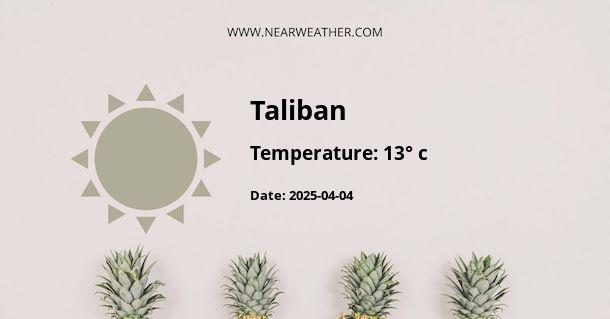Taliban Weather Today
Daily Weather Forecast & Temperature in Taliban
Sun & Moon
Location Info
Embed This Weather
Taliban, Afghanistan - Climate and Weather Year Round
Afghanistan, a landlocked country in Central Asia, experiences a variety of climates due to its diverse topography and geographical location. One of the significant regions in Afghanistan is the region controlled by the Taliban, which primarily consists of the southern and eastern parts of the country. This region is known for its arid and semi-arid climate, with distinctive weather patterns throughout the year.
Spring (March to May)
During spring, the weather in the Taliban-controlled region of Afghanistan begins to warm up after the cold winter months. The temperature gradually rises, with average daytime highs ranging from 20 to 30 degrees Celsius (68-86 degrees Fahrenheit). Nights can still be chilly, with temperatures dropping to around 5 to 15 degrees Celsius (41-59 degrees Fahrenheit).
This season also brings occasional rainfall, but it is generally limited. The average precipitation ranges from 10 to 30 millimeters (0.4-1.2 inches) in total during the spring months. These showers help to rejuvenate the landscape and support the growth of vegetation in the region.
Summer (June to August)
The summer months in the Taliban-controlled region of Afghanistan are characterized by hot and dry weather. Average daytime temperatures can soar to around 35 to 45 degrees Celsius (95-113 degrees Fahrenheit), with some areas experiencing even higher temperatures.
Rainfall during summer is scarce, and the region often faces drought conditions. The average precipitation is usually less than 10 millimeters (0.4 inches) during this period. The lack of rainfall, combined with the intense heat, can make the summer months quite challenging for the people living in the Taliban-controlled areas.
Fall (September to November)
Fall brings relief from the scorching heat of summer in the Taliban-controlled region. The temperature begins to gradually decrease, with average daytime highs ranging from 20 to 30 degrees Celsius (68-86 degrees Fahrenheit). Nights become cooler, with temperatures ranging from 5 to 15 degrees Celsius (41-59 degrees Fahrenheit).
Autumn is also a relatively dry season, with limited rainfall. The average precipitation during this period is similar to spring, ranging from 10 to 30 millimeters (0.4-1.2 inches). The weather during fall is generally pleasant, making it an ideal time to explore the region's landscapes and natural beauty.
Winter (December to February)
Winter in the Taliban-controlled region of Afghanistan is characterized by cold temperatures and occasional snowfall. Average daytime temperatures range from 5 to 15 degrees Celsius (41-59 degrees Fahrenheit), while nighttime temperatures can drop below freezing, reaching as low as -10 degrees Celsius (14 degrees Fahrenheit).
Precipitation during winter is relatively low, with the average snowfall ranging from 10 to 30 centimeters (4-12 inches) during the season. The snow-covered landscapes create a picturesque view but can also make transportation and daily life more challenging for the local population.
Conclusion
The climate in the Taliban-controlled region of Afghanistan is characterized by hot and dry summers, mild springs and falls, and cold winters with occasional snowfall. The region receives limited rainfall throughout the year, with spring and fall being the relatively wetter seasons. Understanding the climate and weather patterns in this region is crucial for residents, travelers, and any organization operating in the area.
What is the Latitude and Longitude of Taliban?
Taliban's Latitude is 37.981251 & Longitude is 41.412209.
What is the weather in Taliban today?
Weather in Taliban is 8° today.
What is the climatic condition of Taliban today?
Climate Conditions in Taliban shows overcast clouds today.
What is the humidity in Taliban today?
Humidity in Taliban is 69% today.
What is the wind speed in Taliban today?
Wind speed in Taliban is 4.97 km/h, flowing at 90° E wind direction.
What does it feel like in Taliban today?
It feels like 7° in Taliban today, with 99% cloud cover and 10 km visibility.
